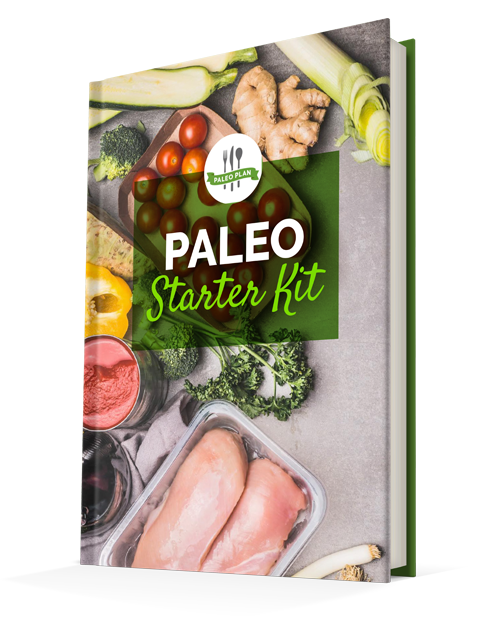
Sleep. We all need it, yet we often have a rough time when it comes to getting enough. In our age of constant movement and running on fumes, it can be easy to lose precious sleep hours due to anxiety, racing thoughts, or even just a general difficulty falling asleep.
Even if you’re a health-conscious person eating a great diet, the effects of not getting quality sleep can be detrimental. Read on to discover why, and how you can easily and naturally improve your quality of sleep with specific foods.
Why Sleep Is a Top Priority
While you might brush off tiredness and lack of sleep as no big deal, you should know that consistently not getting a good night’s rest can have serious side effects well into the future. Not only can lack of sleep cause drowsiness and tiredness, but can also impact your ability to remember and learn, increase your risk for developing heart disease, high blood pressure, stroke, and even diabetes. (1)
Why Choose Natural Sleep Aids?
While pharmaceutical sleep aids may work short-term, they only solve the symptom and not the root of the problem. Even worse, sleeping pills come with a laundry list of side effects, including dizziness, daytime drowsiness, mental slowing, constipation, and headaches. (2)
A healthier option for helping your body achieve a good night’s rest is to use foods that contain specific nutrients that promote healthy sleep and wake cycles. Read on to discover these natural remedies.
9 Foods That Will Improve Your Sleep
1. Wild-Caught Fish
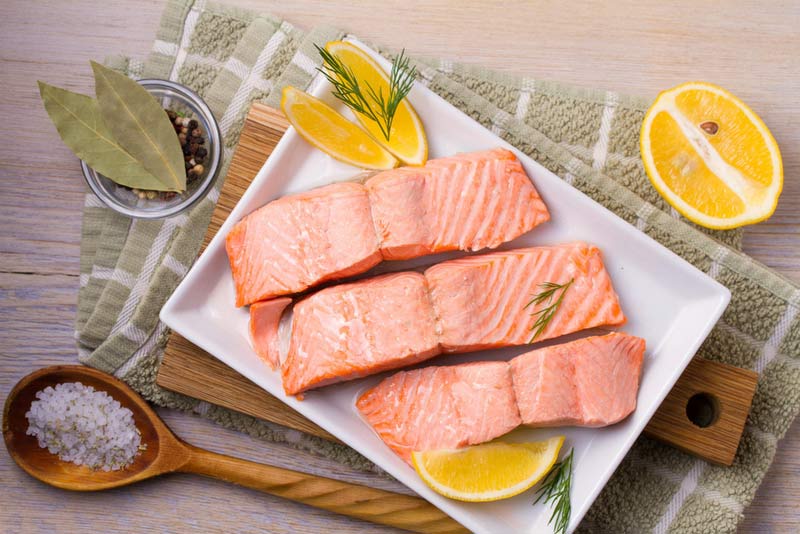
Wild-caught fish is bursting with benefits. From its potent anti-inflammatory omega-3 fatty acids to its rich mineral and B vitamin content, wild-caught fish truly is a superfood.
In fish, B6 is complemented by omega-3 fatty acids, which can improve sleep and brain health. B6 plays an important role in producing melatonin, the hormone that tells our bodies when it’s time to sleep. (3)
One study found that children who eat fish at least once a week sleep better than those who don’t, and experience less sleep disturbances. (4)
As a bonus, not only do you catch more zzz’s, but you might also get a brain boost: the children consuming fish in this study were also found to have IQs four points higher than those who didn’t.
2. Kiwi
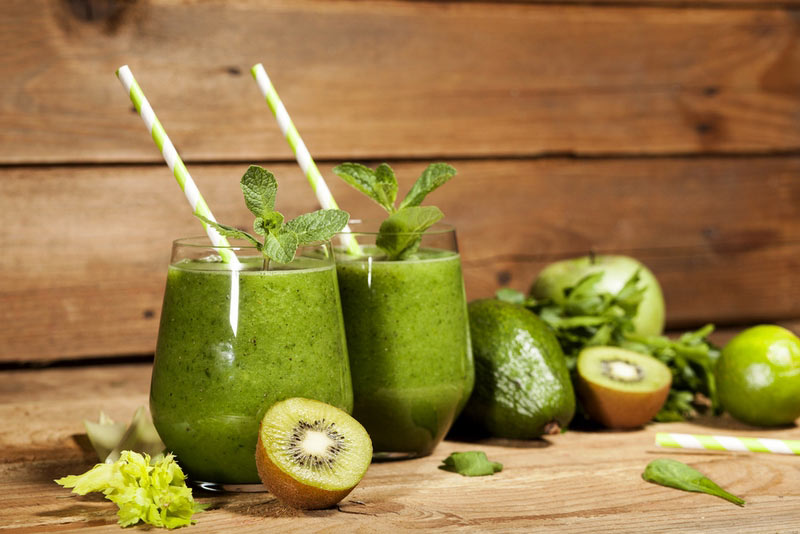
Craving something sweet yet healthy before bedtime? Try a kiwi. These tiny fruits are packed with vitamin C and serotonin, which help promote sleep. One study showed that participants who ate a kiwi an hour before bed slept an additional extra hour compared to participants who didn’t have a kiwi.
The same study also showed that after four weeks of eating kiwifruit, nighttime waking and the length of time it took to fall asleep were significantly decreased, while total sleep time and sleep efficiency were significantly increased. (5)
3. Chia Seeds
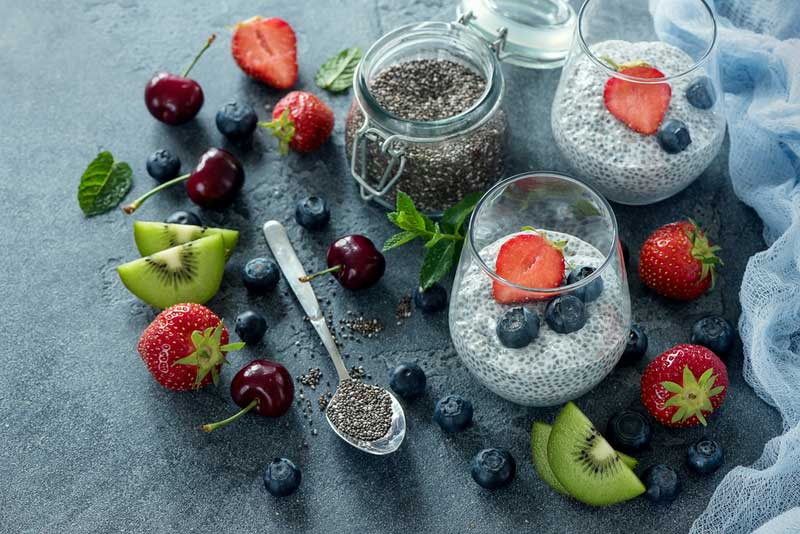
Chia seeds are chock full of fiber. Studies have shown that the absence of enough fiber in your diet can result in “sleep arousals” and is associated with less restorative sleep patterns. (6)
In addition, chia seeds are rich in magnesium, a mineral that can help you relax as well as increase the amount of time you stay asleep during the night and improve your sleep quality. (7)
4. Tart Cherry
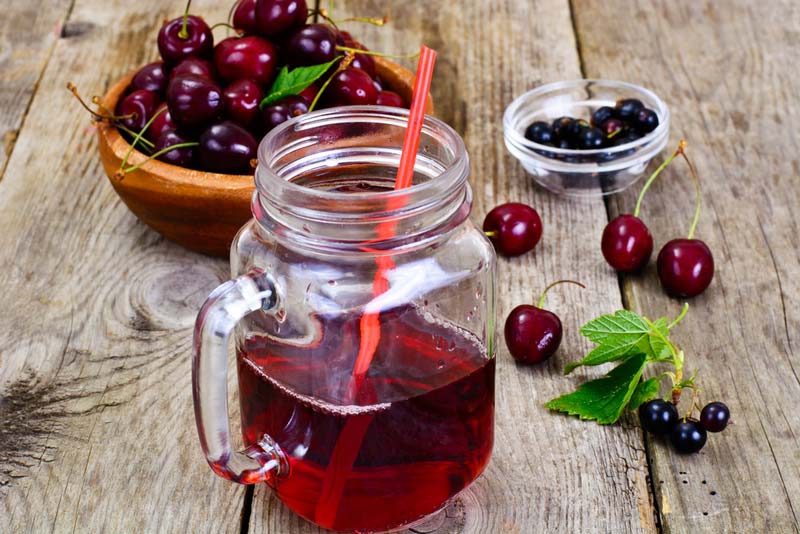
Tart cherry, and specifically tart cherry juice, contains polyphenols that help increase the availability of tryptophan, a precursor to serotonin, which can help promote sleep. They are also a natural source of melatonin, the hormone that helps regulate your sleep and wake cycles.
One study showed that participants who drank tart cherry juice before bed slept an hour longer on average than those who received a placebo. (8)
5. Leafy Greens
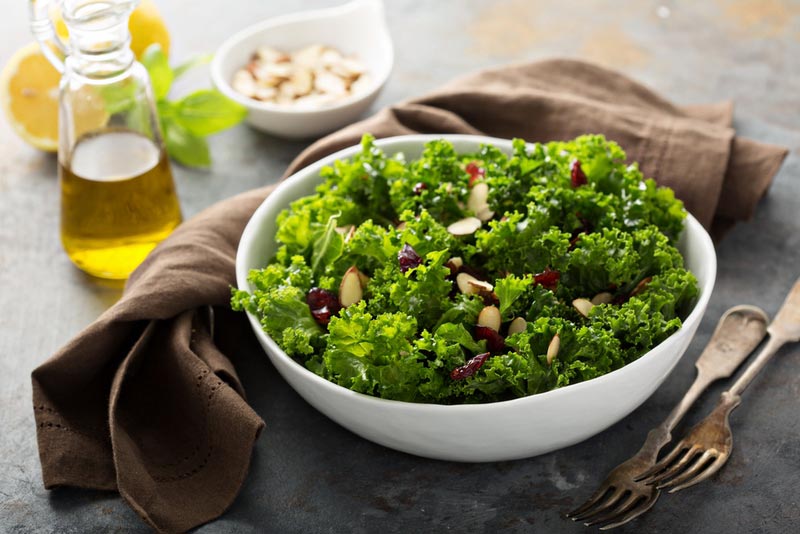
Just when you thought the list of reasons why you should “eat your greens” couldn’t get any longer, another benefit to munching on these colorful leaves sprouts up.
Kale and other greens like chard and spinach are a rich source of calcium, which has been shown in studies to make falling asleep easier and result in a more restorative sleep. Scientists believe this might be due to calcium’s ability to help lower blood pressure, which can make it easier to relax before bed. (9)
In addition, leafy greens are also rich in vitamin C and minerals like selenium, which has been associated with a more restful sleep. (10)
6. Bananas
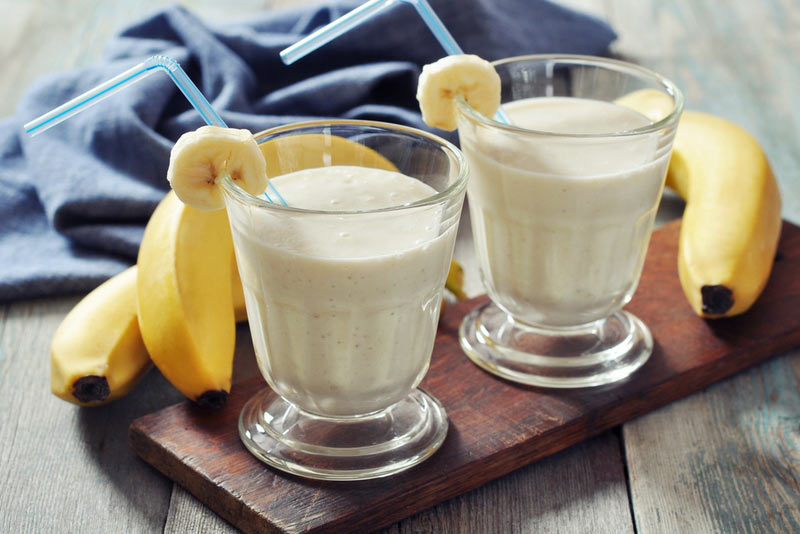
The association between bananas and potassium tends to make us forget all of the other beneficial nutrients these sweet fruits have to offer – namely, the ones that can help you get to sleep.
Aside from potassium, bananas are rich in magnesium, zinc, and melatonin. Individually, each of these nutrients help you relax and promote a more restful sleep. Research shows that when combined, participants have an easier time falling asleep, improved quality of sleep, and improved morning alertness. (11)
7. Almonds
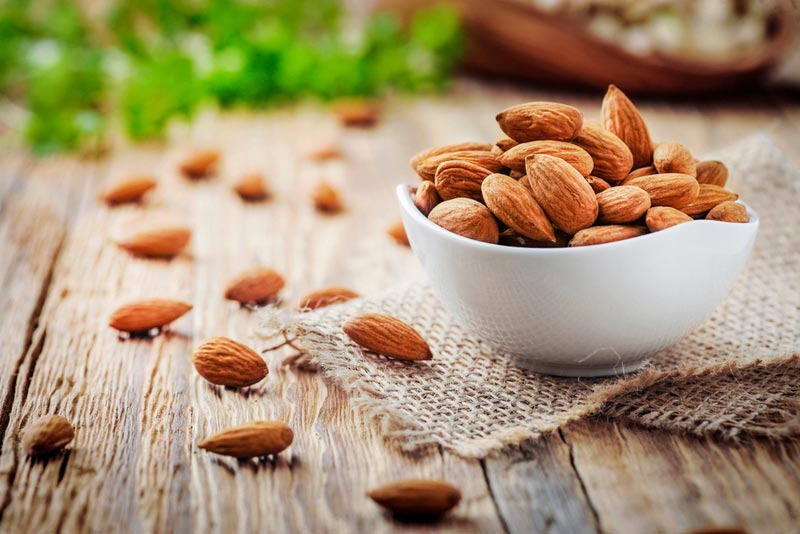
Almonds are another great source of magnesium, which has the ability to relax your muscles, reduce stress and anxiety, and calm your central nervous system. (12) This is especially helpful if you’re suffering from insomnia due to mental restlessness, as magnesium can reduce symptoms of anxiety.
8. Turkey
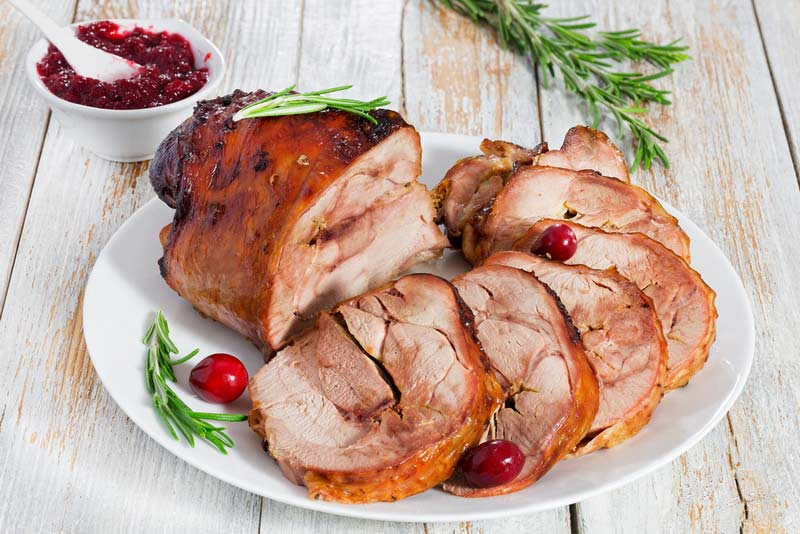
We’re all familiar with that intense need for a nap after Thanksgiving dinner. Turkey is rich in L-tryptophan, the precursor hormone involved in producing melatonin. Research shows that tryptophan increases sleepiness and promotes a restful night’s sleep. (13) As a bonus, studies also show that higher levels of tryptophan can increase serotonin levels, leading to a better mood, so you can wake up refreshed and happy. (14)
9. Walnuts

Walnuts are another tryptophan-rich snack that can help your body synthesize melatonin by strengthening their production “pathways” in your body. (15) This will help improve your sleep-wake cycle by, in essence, making melatonin production easier. In addition, they also contain omega-3 fatty acids, which can improve sleep quality. (16)
Bonus: Carbohydrates Make Tryptophan, Which Promote Restful Sleep
Interestingly, adding a few more carbohydrate sources to your diet can also improve your sleep.
Research shows that ingesting carbohydrates can make it easier for tryptophan, the amino acid that promotes restful sleep, to cross the blood-brain barrier, resulting in higher circulating levels. (17) This is important when we consider eating tryptophan-rich foods to improve sleep, as carbs help the body more efficiently absorb it.
By adding healthy carbs like sweet potato, butternut squash, carrots, and other starches to your diet, you can increase the amount of tryptophan you’re getting from foods like walnuts and turkey.
Counteracting Sleep Deprivation … with Chocolate
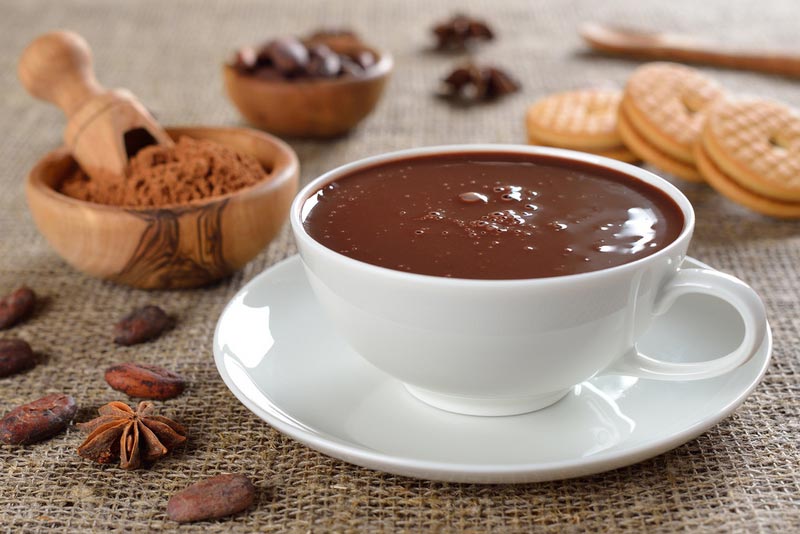
One more bonus for you: dark chocolate (yes, chocolate) can counteract the negative effects of sleep deprivation.
One study involved sleep-deprived participants who consumed a chocolate drink rich in flavonoids, a class of potent antioxidants. The results showed that the flavonoids in the chocolate drink improved artery function and memory performance in the participants, areas that are both commonly affected during sleep deprivation. (18)
So the next time your sleep has been less than optimal, try adding dark chocolate (at least 75 percent cacao content) to your diet.
The Bottom Line
As you can see, there are plenty of foods packed with nutrients to help improve your sleep while also filling any mineral or vitamin gaps you may have that could be contributing to insomnia. Try them out and experiment with the ones you enjoy the most before bedtime, and prepare to catch some much needed zzz’s.

(Read This Next: Melatonin – What It Is, Benefits, and Natural Ways to Boost Levels)
